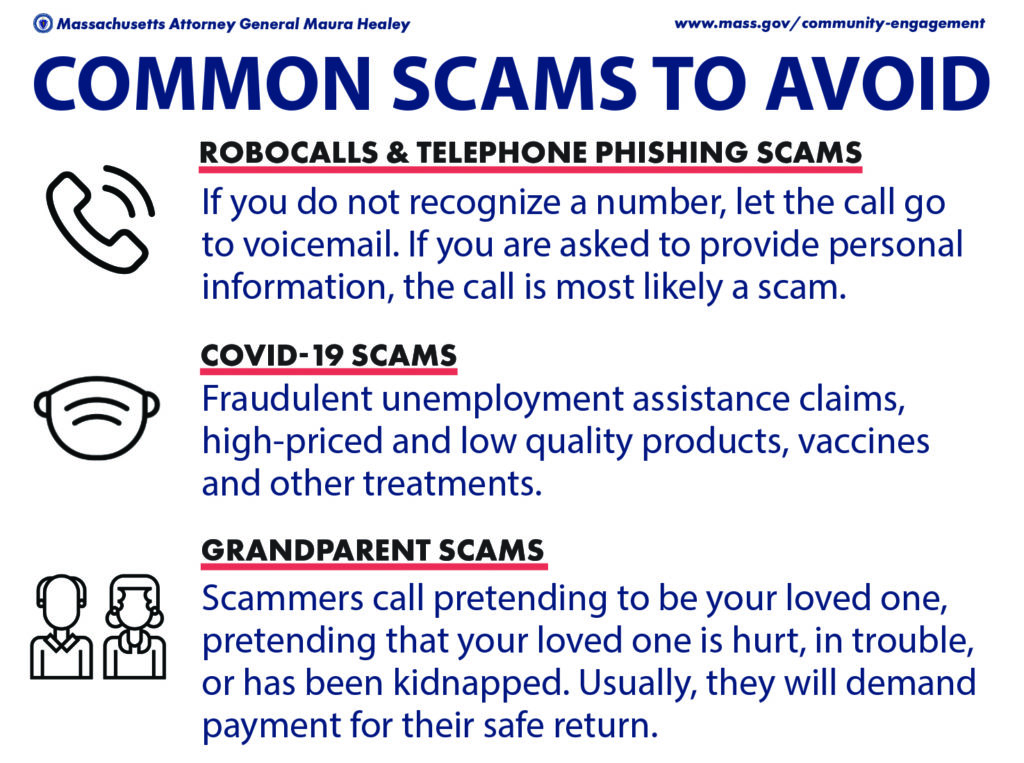
Adapted from a document provided by the Office of Attorney General Maura Healey.
This article originally appeared in the January 2021 edition of Senior Scope. Article by Seth Thomas.
For as long as the pandemic has been making headlines, grifters have been taking advantage of the ever-developing situation. Now, with the rollout of two COVID-19 vaccines, federal agencies are warning the public to remain vigilant as scammers will also take advantage of this latest development.
The sheer volume of reported scams during the COVID-19 crisis have been staggering. The Federal Trade Commission logged more than 260,000 consumer complaints related to COVID-19 and stimulus checks in 2020. A recent report from the House Select Subcommittee on the Coronavirus Crisis found that the Paycheck Protection Program, which was designed to help small businesses cover the cost of payroll, rent, and utilities during the pandemic, could be subject to more than $4.2 billion in fraud and abuse.
And throughout 2020, scammers exploited the general uncertainty brought on by the global health crisis. They posed as the Centers for Disease Control, sending phishing emails in an attempt to gain personal information. Toward the end of February 2020, when COVID-19 had only sickened around 80,000 people worldwide, Facebook was already fighting back against ads on its platform that promised miracle cures for the virus.
The same holds true nearly a year later. As nations around the world slowly start to authorize the use of vaccines developed and tested by major pharmaceutical companies, federal authorities are warning the public to be wary of an onslaught of false promises.
U.S. Immigration and Customs Enforcement (ICE) has turned its focus to fake vaccines and treatments and “expects a surge in illicit attempts to introduce counterfeit versions of approved vaccines into U.S. and global marketplaces,” according to a release from the agency.
For many Americans, the road to receiving the vaccine will be a long one. As vaccines are slowly authorized for use, they will be available for different segments of the population at different times.
Scammers will be preying on an inpatient public stricken by pandemic-fatigue. ICE intends to counter the threat of fake vaccines “by disrupting and dismantling fraud schemes, removing illicit websites and other online marketplaces, and seizing counterfeit or illicit vaccines and treatments.”
The agency is advising the public to avoid purchasing purported COVID-19 vaccines or treatments over the internet or through an online pharmacy, to ignore social media ads promoting cures, and to not respond to texts, emails, or robocalls about vaccines or treatments.
According to Attorney General Maura Healy’s Office, there is no one way to protect yourself from scams since they take on so many forms. However, there are some general best practices you can follow:
- Secure your accounts by regularly changing passwords on your email, banking and other personal accounts.
- Know who you are dealing with when releasing personal information.
Keep records and take notes about all conversations and keep copies of all records. - Shred all important documents like medical bills, bank statements and utility bills.
- Get a copy of your credit report and dispute any fraudulent transactions.
- You can request credit reports online from the three major credit reporting agencies (Equifax, Experian, and Transunion) or by calling 877-322-8228.
Resources
How to Report:
Telephone Scams: 877-382-4357
Mail Scams: 877-876-2455
Internet Scams: ic3.gov
Identity Theft: identitytheft.gov
Contact the AG’s Office:
Elder Hotline: 888-243-5337
Consumer Hotline: 617- 727-8400
Fair Labor: 617-727-3465
Medicaid Fraud: 617-963-2360
.


Recent Comments